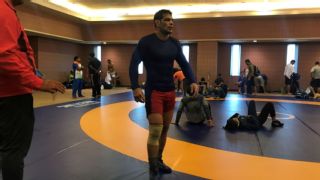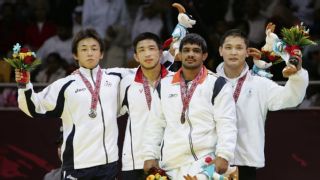|
"Are you nervous?" Sushil Kumar flicks the question away like a bead of sweat on his brow following his final training session ahead of the Asian Games. "Should I be?" asks the 35-year-old with a grin. 'Yes' would be the logical answer. The rest of the Indian team certainly is. The air in the makeshift practice room on the sixth floor of a Jakarta mall is thick with sweaty nervousness. On Sunday, India's campaign at the Asian Games begins on the freestyle mats. The chef de mission of the Indian team, and the president of the national federation has declared that the team will get India off to a winning start. The expectations from Sushil, which will undoubtedly be the highest of all, match the scale of the challenge he is up against. His division is stacked, his bracket almost ridiculously lopsided. Sushil will have to get the better of world bronze medallists Hosseinkhani Mostafa, Olympic bronze medallist Ganzorig Mandakhnaran and defending Asian Games champion Bekzod Abdurakhmonov. History isn't helpful either. Considering his incredible body of work, he has only managed one medal at Asian Games -- a meagre bronze won at his first tournament in 2006. "I've been unfortunate not to win more medals at Asian Games," he said on Saturday. Of course, he was only 23 then -- a wrestler on his way to becoming a double Olympic medallist, a world champion. The greatest in Indian history. Now, there's a gnawing notion that Sushil has hung around too long -- long enough to become a villain almost. His fans grimaced and tried to explain away the farce of wrestlers throwing bouts rather than facing him at the national championships, and the time when an opponent claimed Sushil's followers assaulted him for the temerity of wrestling him at all. And what's even harder for his supporters is to explain his apparent shying away from competition. At the Pro Wrestling League (PWL), Sushil opted out of competing against opponents, including Abdurakhmonov, a possible opponent on Sunday. His supporters will point to the Commonwealth Games where he won gold in April. But to count victories against part-timers from Australia, New Zealand and Great Britain would be a disservice to Sushil's actual legacy.  Sushil believes his reasons were genuine, claiming a knee injury kept him out of the Asian Championships and the PWL. But the murmurs won't go away easily. Perhaps Sushil knows this too. "It's not about proving anything to anyone anymore," he said on Saturday. It's perhaps the best explanation for why he's decided to chance himself against the best in Asia where there is no guarantee of an easy victory. It is a strange thing to go outside your comfort zone. To set yourself up for embarrassment and the 'I told you so's that are sure to follow if he falls early. And yet, he has. In the weeks before the Asian Games, Sushil left New Delhi's Chhatrasal akhara, where he has trained since he was a child and hero worship of him is only a shade less devout than that of Hanuman, the Hindu god of strength, himself. He headed to Georgia. Adulation, while wonderful for the ego, would not help him prepare for the challenge he was up against. "It's impossible for Sushil to get the kind of competition in India. Even at the akhara, sometimes he tells others 'thoda zor laga do' (push harder)," says an associate of Sushil. Georgia, with its surfeit of Olympic and World champions like himself, gave him much-needed anonymity too. "In India he would finish his training and immediately after that he would be pestered by people. Someone would say 'pehelwan ji (wrestler sir), my son is creating trouble, please talk to him. Or my child needs admission to a school, please talk to someone.' Sushil wouldn't have a problem with this but a wrestler can't be doing this," says a wrestler from Sushil's academy.  Sushil competed in Georgia too. The result in the first round of the Tbilisi Grand Prix wasn't like those in India, where wrestlers conceded matches to him out of respect. Poland's Andrzej Piotr Sokalski, a solid but unspectacular wrestler, beat him 8-4, a loss that taught Sushil his own limitations. "Sushil's arms were simply not working. His entire career he had simply overpowered his opponents with (his) work rate. I don't think it had ever happened before," says an official who accompanied him. It had happened to Sushil before, as it would have had to all athletes. DOMS (delayed onset muscle soreness) is the technical term, but the leaden limbs it results in are familiar to first-time gym rats the world over. "It's something that young athletes have after a heavy workout for the first time, but it's something that your body adapts to. But when you get older your body doesn't recover the way it used to," says a physiotherapist who works with the Indian team. Simply put, Sushil can't recover between bouts as he did when he was younger. "An older wrestler can still manage. He can time his shots rather than take as many as he would when he was younger. But of course as you get older, your stamina goes," says national coach Jagmender Singh. Despite his limitations, few would write Sushil off at this stage. "There are few wrestlers for whom the draw doesn't matter. You put them anywhere and they will still reach the final. Sushil is one of them," says Wrestling Federation of India (WFI) president Brijbhushan Sharan. His opponents - not even the ones who are favoured to beat him - won't do so either. "Sushil is a great wrestler. His age doesn't matter. He might be older but he has more experience now," says Abdurakhmonov. Sunday will determine whether that is indeed the case. For his part, Sushil has made his peace with any possible outcome. "It doesn't matter if I win or lose. I don't look at the opponent anymore. I don't look at my draw. I have come here to wrestle. I have prepared well. I will look to wrestle at my potential. There is no fear. Maaze se khelunga (I'll enjoy myself)," he says.
|
